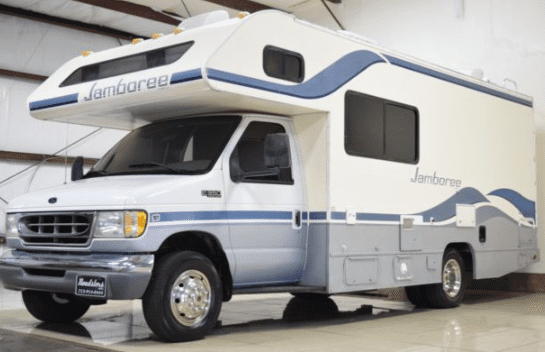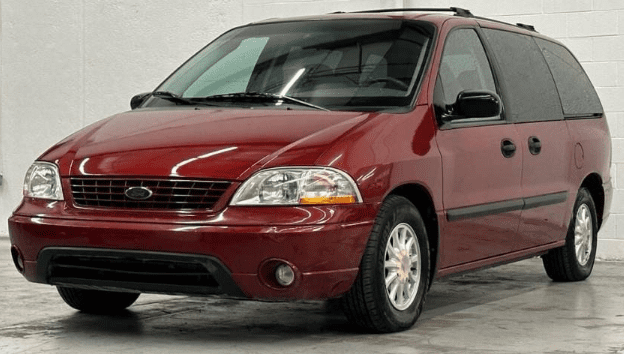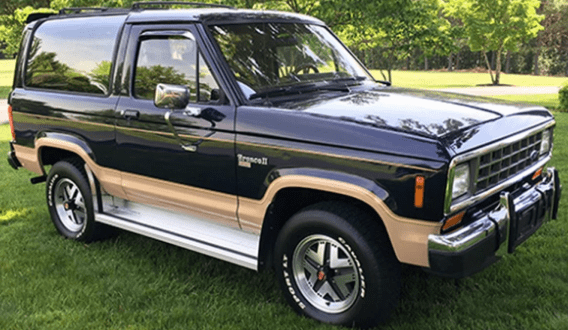[Top 8 Fixes] Ford v10 Motorhome Transmission Problems
Last Updated on October 9, 2023 by Robert Wilson
If you are an avid traveler or a dedicated road trip enthusiast, you might have come across the ever-reliable Ford V10 motorhome.
This powerful machine has been a popular choice among motorhome enthusiasts for its performance and reliability.
In this article, we will explore some of the common issues that Ford V10 motorhome owners might face and provide valuable insights into preventing and addressing these concerns.
Understanding Ford V10 Motorhomes
Before we get into the most common issues, let’s take a moment to understand what makes Ford V10 motorhomes so appealing.
These motorhomes are equipped with a robust V10 engine, which delivers ample power and torque, making them ideal for long journeys and hauling heavy loads.

Their spacious and comfortable interiors, coupled with various amenities, provide a luxurious and enjoyable travel experience.
Common Problems with Ford V10 Motorhomes
Engine Performance Issues
One of the primary areas where Ford V10 motorhome owners might encounter problems is the engine performance.
Some of the common engine-related issues include:
Poor Fuel Efficiency
Many Ford V10 motorhome owners express concerns about the vehicle’s fuel efficiency. The V10 engine, while powerful, can be quite thirsty, especially when navigating steep terrains or facing strong headwinds. Proper driving techniques and regular maintenance can help improve fuel economy.
Rough Idling
Experiencing rough idling can be frustrating and indicates potential issues with fuel delivery, ignition, or engine sensors. Ignoring this problem may lead to more severe engine malfunctions.
Misfiring
Misfiring occurs when the engine cylinders fail to ignite the fuel-air mixture properly. This can result in power loss, decreased fuel efficiency, and increased emissions. Identifying and rectifying the root cause is essential to prevent further damage on your Ford V10 motorhome.
Ford V10 Motorhome Transmission Issues
The transmission is another critical component that may present problems in Ford V10:
Shifting Difficulties
Difficulty in shifting gears or a delayed response could indicate Ford V10 transmission issues. Low transmission fluid levels or damaged components might be the culprits behind this problem.
Transmission Fluid Leaks
Leaking transmission fluid can lead to low fluid levels, causing increased friction and potential damage to the transmission system. It is vital to address any leaks promptly.
Cooling System Challenges
Maintaining an optimal operating temperature is crucial for the engine’s health:
Overheating
Extended periods of driving in high temperatures or a malfunctioning cooling fan can cause overheating, which can be detrimental to the Ford V10 engine’s longevity.
Coolant Leaks
Coolant leaks should never be ignored, as they can lead to engine overheating and severe damage. Regularly inspecting the cooling system can help identify and fix leaks early.
Electrical Glitches
Electrical problems can cause a range of issues in your Ford V10 motorhome:
Battery Drainage
Leaving electronic devices on or a faulty charging system can drain the battery, leaving you stranded. Identifying the source of Ford V10 battery drainage is vital to prevent future V10 incidents.
Electrical Shortages
Short circuits or damaged wiring can lead to electrical failures in the Ford V10 motorhome. Thoroughly checking the electrical system can help locate and resolve these shortages.
Suspension and Handling Concerns
The motorhome’s suspension system plays a crucial role in providing a comfortable ride:
Uneven Tire Wear
Uneven tire wear can be an indicator of alignment or suspension issues. Promptly addressing this problem can prevent further damage to the Ford V10 motorhome tires.
Excessive Bouncing
Experiencing excessive bouncing or swaying can make driving unsafe and uncomfortable. Professional inspection and maintenance can rectify these handling issues.
Ford 6.8 Triton V10 Engine Problems
Ford’s 6.8 Triton V10 engine has been a popular choice for many vehicles, including trucks and motorhomes, due to its power and reliability.
However, like any engine, the 6.8 Triton V10 is not without its share of issues.
In this article, we will explore some of the common Ford V10 problems that owners of vehicles equipped with this engine might encounter and ways to address them.
1. Spark Plug Blowout (pre-2002)
One of the well-known issues with the earlier versions of the Ford 6.8 Triton V10 engine, specifically those manufactured before 2002, is the occurrence of spark plug blowouts.
This problem arises due to the design of the spark plugs and the threads in the cylinder heads.
The spark plugs can become dislodged or blown out of the cylinder head, leading to poor engine performance and potential damage.
Addressing the Issue:
If you experience a spark plug blowout, it is essential to address it promptly.
You may need to replace the affected spark plug and use a specialized thread repair kit to fix the damaged threads in the cylinder head.
It’s recommended to have this repair done by a professional mechanic with experience in dealing with this specific issue.
2. PCV Hose Crack
The Positive Crankcase Ventilation (PCV) hose is responsible for recirculating harmful vapors from the engine’s crankcase back into the intake manifold for combustion.
Over time, the PCV hose in Ford 6.8 Triton V10 engines can develop cracks or leaks, allowing unfiltered air to enter the engine, which can lead to rough idling, reduced fuel efficiency, and increased emissions.
Addressing the Issue:
Inspect the PCV hose regularly for any signs of wear or damage, such as cracks, splits, or leaks.
If you notice any issues, replace the PCV hose with a new one from a reputable manufacturer. Regular maintenance and periodic checks can help prevent PCV hose-related problems.
3. Exhaust Manifold Failure
Exhaust manifold failure is another common problem observed in Ford 6.8 Triton V10 engines.
The exhaust manifolds are responsible for collecting exhaust gases from the engine cylinders and directing them to the exhaust system.
Over time, the constant heating and cooling can cause the exhaust manifolds to crack or warp, leading to exhaust leaks and a noisy engine.
Addressing the Issue:
If you suspect an exhaust manifold issue, have the engine inspected by a professional mechanic.
Depending on the extent of the damage, the exhaust manifold may need to be repaired or replaced.
Addressing this problem promptly can prevent further damage and improve engine performance.
4. Gas Mileage
While not a specific mechanical problem, some Ford 6.8 Triton V10 engine owners may find that their vehicles have lower gas mileage compared to other vehicles.
The V10 engine’s size and power output can contribute to relatively lower fuel efficiency, especially when compared to smaller engines.
Addressing the Issue:
Improving gas mileage in a vehicle equipped with a Ford 6.8 Triton V10 engine requires conscious driving habits and regular maintenance.
Maintaining proper tire pressure, performing regular engine tune-ups, and avoiding aggressive driving can help optimize fuel efficiency.
In a nutshell, while the Ford 6.8 Triton V10 engine is renowned for its power and reliability, it is essential for owners to be aware of some common issues that may arise.
Regular maintenance, proactive inspections, and timely repairs can help mitigate these problems and ensure the engine’s longevity and optimal performance.
If you experience any significant issues with your Ford 6.8 Triton V10-powered vehicle, seek assistance from qualified mechanics to address the problems promptly and effectively.
Tips for Preventing and Addressing Problems
To ensure your Ford V10 motorhome operates smoothly, consider the following tips:
Regular Maintenance and Inspections
Scheduled maintenance and thorough inspections are essential to catch potential problems early and keep your Ford V10 motorhome in top shape.
Proper Engine Warm-up
Allow the engine to warm up before setting off on your journey to avoid strain on the Ford V10 engine components.
Fluid Checks and Replacements
Regularly check and replace engine oil, transmission fluid, coolant, and other essential fluids to maintain optimal Ford V10 performance.
Addressing Electrical Issues
If you notice any electrical glitches on Ford V10, have them diagnosed and repaired by a professional electrician.
Suspension Maintenance
Maintaining the suspension system and promptly addressing any handling concerns can enhance the Ford V10 driving experience and safety.
FAQs
(1) How often should I get my Ford V10 motorhome inspected?
Regular inspections are recommended at least once every six months, and before and after long trips.
(2) What can cause rough idling in my motorhome?
Rough idling can be caused by issues with the fuel system, ignition system, or engine sensors.
(3) Can I replace the transmission fluid myself?
While it is possible to do it yourself, it is recommended to have it done by a professional to ensure proper handling and disposal of the old fluid.
(4) How can I improve the fuel efficiency of my motorhome?
You can improve fuel efficiency by maintaining a steady speed, avoiding rapid acceleration, and keeping up with regular maintenance.
(5) Is overheating a serious problem that requires immediate attention?
Yes, overheating is a serious problem that demands immediate attention. If you notice the temperature gauge rising or steam coming from under the hood, pull over to a safe location and turn off the engine.
(6) What type of engine oil should I use for my Ford V10 motorhome?
Always refer to your motorhome’s owner’s manual for the manufacturer’s recommended engine oil specifications. Typically, a high-quality synthetic oil is preferred for its superior performance and longevity.
(7) Can I tow a trailer with my Ford V10 motorhome?
Yes, Ford V10 motorhomes are designed to tow trailers and other recreational vehicles. However, make sure to adhere to the manufacturer’s towing capacity and follow proper towing practices for safety.
(8) Why is my motorhome experiencing reduced power during uphill climbs?
Reduced power during uphill climbs could be due to various factors, including a clogged air filter, worn-out spark plugs, or issues with the fuel delivery system.
(9) How can I prevent battery drainage when my motorhome is in storage?
To prevent battery drainage during storage, disconnect the battery or use a battery maintenance device to keep it charged. It’s also a good idea to start the motorhome and let it run for a few minutes every few weeks.
(10) Are there any recalls or common issues specific to Ford V10 motorhomes?
Occasionally, manufacturers issue recalls to address specific problems in their vehicles. To stay updated on recalls or known issues, check with your local Ford dealership or visit their official website.
Conclusion
Ford V10 motorhomes are undoubtedly reliable and powerful companions for memorable road trips.
However, being aware of the common problems that may arise and taking proactive measures to prevent and address them is crucial to ensure a smooth and enjoyable journey.
Regular maintenance, attentive driving, and timely repairs can keep your Ford V10 motorhome in top-notch condition.


